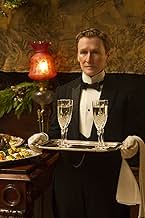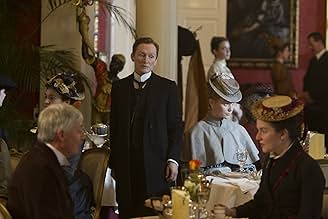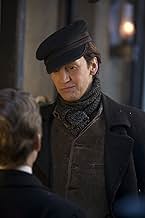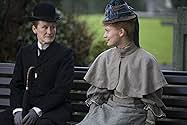Albert Nobbs kämpft im Irland des späten 19. Jahrhunderts, in dem Frauen nicht dazu ermutigt werden, unabhängig zu sein, ums Überleben. Albert, die sich als Mann ausgibt, damit sie als Butle... Alles lesenAlbert Nobbs kämpft im Irland des späten 19. Jahrhunderts, in dem Frauen nicht dazu ermutigt werden, unabhängig zu sein, ums Überleben. Albert, die sich als Mann ausgibt, damit sie als Butler im elegantesten Hotel von Dublin arbeiten kann, lernt einen gutaussehenden Maler kennen ... Alles lesenAlbert Nobbs kämpft im Irland des späten 19. Jahrhunderts, in dem Frauen nicht dazu ermutigt werden, unabhängig zu sein, ums Überleben. Albert, die sich als Mann ausgibt, damit sie als Butler im elegantesten Hotel von Dublin arbeiten kann, lernt einen gutaussehenden Maler kennen und versucht der Lüge zu entkommen, die sie bis dahin gelebt hat.
- Für 3 Oscars nominiert
- 19 Gewinne & 43 Nominierungen insgesamt
- Joe
- (as Aaron Johnson)
- Emmy
- (as Antonia Campbell Hughes)
Empfohlene Bewertungen
Albert Nobbs (Close) leads a simple life as a butler at a fancy hotel in turn of the century Dublin. But he is hiding a secret: he is actually a she, staying low-key while she raises enough money to start a tobacco shop. With the appearance of Hubert Page (Janet McTeer), a painter who hides a similar secret, Nobbs realizes she needs to come out of her shell a bit more and start planning her future.
I desperately wanted to adore Albert Nobbs, but after the initial play-like introduction to all of the main players (in one scene no less), I found myself horrifically bored from start to finish. Remember the stuffy British period pieces you loathe the very existence of, and were hoping were completely extinct? I am sorry to report they are alive and well. The film moves at a snail's pace, going through Nobb's attempt at prepping to move on and stop hiding. It goes through a few incredibly odd subplots, one namely involving a pretty house maid named Helen (Mia Wasikowska), but feels badly cobbled together. It is based on a critically acclaimed play that Close had previously starred in and feels like it is stuck within the confines of that pace and structure. I realize they wanted to stay true to the original source material, but I am confident in saying that we have seen enough films based on musicals and plays to know that it is not hard to think outside the box and make something a bit different and more inclined to the medium.
For all the early Oscar talk, it disappoints me to say that Close's performance is good but nothing truly extraordinary. She is incredibly convincing as the titular character, looking nearly unrecognizable for a good portion of the film. She plays Nobbs as a timid introvert, who has an underlying fear that plagues her every move. She does want her true identity to be revealed, and must constantly downplay everything. It may seem like an incredibly layered role, but outside of some atypical glances, there is really nothing special about Close. Her character wants to hide in plain sight, and not do anything to draw attention to herself. But this affects Close's performance immensely, because it never gives her the opportunity to make something of this character. Mere glances and passing references to something truly brilliant are apparent, but I found myself really struggling to care about the character. Much like the film, paying attention to Nobbs bordered on excruciatingly boring.
McTeer as Page however, the other woman playing a man in this grand play, is the exact opposite. I had heard very little about her before the film, but found myself unable to look away when she entered the frame. She has a sassy wit about her, and truly enlivens the characters and every second-rate line that comes out of her mouth. She is the catalyst for change in Nobb's life, but she too is doing her best not to draw attention to herself. Yet somehow, she does not slog through the performance like Close does. She truly makes something of the character, and carves out something interesting and fun to watch develop. It is not surprising at all surprising to find that she provides the most emotional scenes in the movie, b both downright hilarious and incredibly sad. I just wish there was more focus on her character, as she only appears in a handful of scenes. Fortunately they are the best scenes in the entire film, but they come way too far and few between.
Wasikowska and Aaron Johnson are the only other two actors who do not spend their screen time eliciting minor laughs from the crowd (although Pauline Collins is an underplayed delight as Mrs. Baker, the head of the hotel where most of the action takes place). While they have both given significantly better performances in other films, they both deliver some fairly solid work here. They have to chisel through some absolutely obnoxious and dull character motivations and actions, but they still shine through in most cases. I appreciated their work here more than I actually enjoyed it, but I think it could have been improved if they were not stuck working within the confines of the script.
Story and acting issues aside, the art direction is simply marvelous. The look of Dublin is so rich and vivid that you can practically smell the putrid stench coming off of these streets. A lot of care was put into making these sets and costumes look as detailed as physically possible, and it shows in how great they look. I sat in awe in more than one occasion, ignoring the inane dialogue and just taking in the scenery.
While I think the laughs that made The King's Speech such a crowd-pleasing delight last year may have had a bit of an influence on at least a portion of Albert Nobbs, I really wish they took more of a directional cue from the Best Picture winner. As it is, Nobbs is the kind of stuffy, pretentious period piece that most filmgoers love to hate. It is incredibly boring, with a lot of useless side performances and only a few good performances that still manage to be dull. The only real saving grace here is a wildly enjoyable supporting turn from McTeer, who will surely not see that enthusiasm go to waste when the awards time arrives. Maybe I should not have expected so much.
6/10.
Albert Nobbs is a curious story, perhaps not like anything else you've seen. If you wait until the end, you may love hearing Sinead O'Connor sing "Lay Down Your Head." But in between beginning and end is a performance by Glenn Close as a gender-bending butler in 1890's Dublin to confound critics who use Meryl Streep as their litmus test.
Where Streep infuses her characters with at least a few eccentric affectations, Close's Albert is a fascinating cipher of a woman playing a man so tied up like her corset that she rarely changes expression; her immobile face resembles a plastic-surgery job wound like her too tight, afraid to laugh or cry for fear of pulling her skin down from its moorings behind the ear. The stoicism is, however, not without its oddball charm, as you are unlikely to meet such an introvert, who is rivaled only by Melville's classic Bartleby.
Albert decides to woo young Helen (Mia Wasikowska) to marry him and settle into a tobacco shop, even though he has not told her he is a woman. Albert is helped by another disguised female, Hubert, played Oscar-worthy by Janet McTeer. Although Close, a producer and co-writer, doesn't reveal much about Albert's background and the reason for remaining in disguise other than the difficulty of single women surviving in late nineteenth-century Dublin, McTeer's Hubert satisfies us with background information and a current marriage inspiring Albert to pursue Helen.
The short story and the 1982 play, for which Close as Albert won an Obie, might be warmer and more accessible. Although the film has much of John Huston's The Dead in its set design, Huston's and James Joyce's character development and disclosure are leagues ahead of this minimalist script and sets.
As annoying as Albert is in his privacy, Close's Chaplinesque costuming and minimalist performance won't go away. Watch out, Meryl.
The cinematography was beautiful as were the costumes and sets. Can't really say anything bad about this production.
What can you say about Glenn Close? She continues to stretch herself in unanticipated ways. Janet McTeer's performance is brilliant and nuanced; I could not take my eyes off her.
I'm still thinking about the film today. Powerful filmmaking.
The waves of emotion which she wraps into Hubert Page are a wonder to behold. Her performance is not one of those 'knock me over with a feather' performances; it's more like a performance that settles in the bottom of your heart and stays there well after the movie ends. It keeps you up at night, and tugs at you for days afterward.
The story itself is more layered than it appears to be. Glenn Close has brought to the screen a very private yet very emotional character. Such a character is difficult to portray -- and the 'talking to one's self scenes' were a bit annoying, as all such scenes are.
In the end, however, this is a movie well worth your time.
I'm always skeptical of performances that are claimed to be "fully unrecognizable" and at first I must admit that it just felt like Close playing a man, but as the film continued I slowly lost sight of my cynicism and when a later scene portrays Nobbs wearing a dress for the first time I was blown away at the fact that I was seeing this woman be a real woman for the first time. I was amazed at how absorbed Close was in the role, I genuinely forgot all about this woman playing a character and just believed the character's facade, as well as Close's. Close has gotten attention for the role as a potential Oscar vehicle and some have lashed back against that due to the performance being quite restrained, but I admire her delicacy in taking on the role. This is a woman who spent her entire life trying to blend in and be unseen, and Close's ability to be this fly on the wall creature is remarkable.
I was glad that there weren't any hysterics on her part and when the few scenes came where, in isolation, she broke down I was devastated by this woman fearing for her life to unravel. It's such a delicate and entirely human performance, and as far as I'm concerned one of the best of Close's very strong career. The central narrative revolves around Nobbs' desire to woo a young maid named Helen (played with an Irish tilt by the up-and-coming Australian Mia Wasikowska, again shining) to leave their life of servitude and open up a tobacco shop together. Throughout the film I was bothered by this belief that Nobbs was supposed to be in love with Helen and that's why she wanted to open the shop with her, but as the film reached it's final conclusion I came to the realization that it had nothing to do with love.
Throughout her life Nobbs had put in all of her effort to having no one notice her that when she's introduced to a similar woman masquerading as a man (played by the strong and unbelievably convincing Janet McTeer) who has a happy life married to a woman, Nobbs realizes the potential that maybe she doesn't have to live her life alone. It's not about loving Helen at all, it's just about not wanting to be alone anymore and once that became apparent to me the film became quite devastating. Nobbs trapped herself in this prison and Close plays it with such restrained heartache that it truly hit a level with me. Even in writing this I am realizing that the film had a much stronger impact on me than I had previously thought. This is a devastating story of a woman trapped in circumstances of her own making, portrayed with such genuine believability by Close that I forgot I was watching an actress pretend to be a man but instead just saw Nobbs.
There's a line where McTeer's character asks Nobbs what her name is and she responds, "Albert". Then McTeer repeats the question, clearly asking for her birthname instead of the one she is hiding behind and Nobbs again responds, "Albert". At the time I rolled my eyes at the exchange, but now that the whole film has settled with me it speaks so much to this trapped, wounded soul who was so lost in herself that she couldn't escape her own prison, let alone the one that she had built for Nobbs. I found Albert Nobbs to be quite the moving, hushed character piece led by a wrenching performance by Close and backed up by several other strong performances from McTeer, Wasikowska and a grimy Aaron Johnson.
Wusstest du schon
- WissenswertesGlenn Close not only stars as the lead character Albert, but she also co-wrote the screenplay, wrote the original song for the film and produced.
- PatzerWhen Glenn Close is running on the beach, she falls down in a spot where it is obvious that the sand was disturbed in a previous shot or rehearsal.
- Zitate
Albert Nobbs: A life without decency is unbearable.
- VerbindungenFeatured in The Tonight Show with Jay Leno: Folge #20.67 (2012)
Top-Auswahl
Details
- Erscheinungsdatum
- Herkunftsländer
- Offizieller Standort
- Sprache
- Auch bekannt als
- The Singular Life of Albert Nobbs
- Drehorte
- Produktionsfirmen
- Weitere beteiligte Unternehmen bei IMDbPro anzeigen
Box Office
- Budget
- 8.000.000 $ (geschätzt)
- Bruttoertrag in den USA und Kanada
- 3.014.696 $
- Eröffnungswochenende in den USA und in Kanada
- 696.088 $
- 29. Jan. 2012
- Weltweiter Bruttoertrag
- 7.532.259 $
- Laufzeit1 Stunde 53 Minuten
- Farbe
- Sound-Mix
- Seitenverhältnis
- 2.35 : 1









































